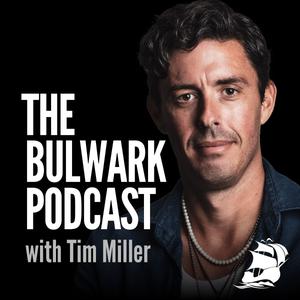
Battleground with Amanda Litman and Faiz Shakir
iHeartRadio
- 48 minutes 8 seconds‘Speed Kills’ with Maggie Haberman and Addisu Demissie
Amanda brings Battleground fans a very special series finale, featuring guest co-host Addisu Demissie and a conversation with Maggie Haberman of The New York Times. Addisu is the CEO of More Than a Vote, a voting rights organization started by LeBron James. He has spent decades in politics, most recently as a campaign manager for Senator Cory Booker’s presidential run, and California Governor Gavin Newsom’s gubernatorial campaign in 2018. Maggie is a Pulitzer Prize-winning journalist and the Washington correspondent for The New York Times. She is currently writing a book about the former president.
In the last episode of Battleground, the three friends argue and agree about all things Twitter, the media, and politics. Plus, Amanda and Addisu discuss election results across the country, with progressives securing some big wins at the municipal level, while other Dems got served a rude awakening at the state level. But stay positive, folks, as we head into 2022 — teamwork makes the dream work. A big thanks to everyone who’s supported the show — now get out there and run for something.
Hosted on Acast. See acast.com/privacy for more information.
4 November 2021, 2:30 pm - 36 minutes 20 secondsDigging in the Dirt with David Brock“In conservative media, there’s an incentive to put out misinformation, and to essentially lie.” David Brock, founder of Media Matters — a rightwing media watchdog group — knows exactly how the conservative media ecosystem works, because that’s where he cut his teeth. For the first half of his career as a journalist, David got caught up in what he now describes as a cult, working at places like the Washington Examiner and the Heritage Foundation, until he managed to break ranks and turn against them. David joins Amanda this week to discuss the unconscionable actions of Fox News, his efforts to create robust media infrastructure for Democrats and progressives, and the struggle to get investors on the left to pay attention to Virginia’s elections, despite their massive importance to the Democratic party heading into 2022. Plus: while the rest of the world enjoys an average of 26 weeks paid maternity leave, the great USofA and our highly functional legislative branch can’t even manage a measly four. Cool.
Hosted on Acast. See acast.com/privacy for more information.
28 October 2021, 7:00 am - 38 minutes 48 secondsSecret Contracts and Slow-Moving Coups with Luppe B. LuppenAmanda’s Twitter fav, Luppe B. Luppen — also known as @nycsouthpaw — joins "Battleground" to analyze some of the biggest stories in politics. First, Amanda and Luppe dissect the secret agreement, between Senate Majority Leader Chuck Schumer and West Virginia Senator Joe Manchin, that capped overall spending on the Democrats' reconciliation bill at $1.5 trillion. They pick apart the draft materials released by Biden’s SCOTUS Commission and discuss what legal options the January 6th committee has when it comes to enforcing subpoenas. Finally, Luppen breaks down a topics he's researching for an upcoming book: the 2020 Iowa Democratic caucus debatable and the (unlikely) chances for reform. Plus: it’s Striketober!
Hosted on Acast. See acast.com/privacy for more information.
21 October 2021, 7:00 am - 38 minutes 33 secondsTX Republicans are Cavemen Living on Borrowed Time with Julián CastroJulián Castro, former Mayor of San Antonio and Secretary of Housing and Urban Development for the Obama administration, joins the show this week to shed light on a range of issues troubling America. The groundbreaking 2020 presidential candidate and Amanda discuss the ongoing housing affordability crisis; the transformational impact universal pre-K could have on our society; and the small group of conservative Texas politicians desperately clinging to their gerrymandered power, one regressive state bill at a time. Plus: why understanding the media ecosystem in which Democratic candidates operate is just as — if not more — important than the message they’re running on.
Hosted on Acast. See acast.com/privacy for more information.
14 October 2021, 7:00 am - 37 minutes 24 secondsTo Reach Young Voters, Try Giving a Sh*t with Cristina Tzintzún RamirezMore than half of Americans are under the age of 40, and according to Cristina Tzintzún Ramirez, President and Executive Director of NextGen America, they are facing three crises simultaneously — a climate catastrophe, a democracy in decline, and grotesque income inequality. Cristina is a progressive labor organizer and former 2020 U.S. Senate candidate who truly understands the complexity of the youth vote, especially in her home state of Texas, and particularly within the Latino community. She joins Amanda this week to pull apart the Democrats’ mistaken assumption that young voters are all college kids; discuss why campaigns clinging to the ‘young people don’t vote’ myth after impressive turnout in 2020 do so at their own peril; and, as always, they tackle money in politics. Plus, breaking up Facebook: it’s time.
Hosted on Acast. See acast.com/privacy for more information.
7 October 2021, 7:00 am - 42 minutes 41 secondsFollow the Money with Judd Legum of Popular Information
Judd Legum, author of the progressive newsletter, Popular Information, and former founder of ThinkProgress, can tell you with certainty that there’s too much money in politics, that legislators prioritize corporations over people, and that the media does a pretty bad job at covering all of it. He joins Amanda this week to discuss what the major news outlets are missing, getting wrong, and forgetting too quickly, and why. They get into which corporations pretend to champion gender equality and social justice; why so many public servants eventually join lobbying firms; and what’s wrong with political newsletters “brought to you by Chevron.” Plus, your weekly dose of Manchin shit-talking.
Hosted on Acast. See acast.com/privacy for more information.
30 September 2021, 7:00 am - 34 minutes 54 secondsHacking the Democratic Primaries with Maurice Mitchell
Third parties are famous for siphoning off votes from the major parties and ruining elections. While this phenomenon, known as the spoiler effect, is real, America's two-party system makes for strange bedfellows. It's not obvious what a democratic socialist like AOC has in common with a conservative Democrat like Joe Manchin, other than a "D" after their names.
So what can reform-minded progressives do? How can they advocate for systemic change without tilting the field in the Republicans’ favor? Maurice Mitchell, a seasoned organizer and National Director of the Working Families Party, joins Amanda this week to discuss the WFP’s decades-long effort to build substantive, multiracial political power for the working class. The WFP emerged in 1998 as a direct response to the conservative-corporate takeover of American politics. Maurice details his party’s multifaceted approach that has its sights set not only on conservative Republicans, but on establishment Democrats in very blue districts who are out of step with the needs of their communities. In other words, the WFP is providing progressives, the working class, and people who don’t identify with either party a path to representation in government through collective organization. Just how effective are they? Ask now-former Governor Andrew Cuomo.
Hosted on Acast. See acast.com/privacy for more information.
23 September 2021, 7:00 am - 37 minutes 28 secondsQAnon: Coming to a School Board Near You with Mike Rothschild
America’s lack of media literacy and historical affinity for conspiracy theories have allowed QAnon to move from the dark corners of the web to violence at the US Capitol. Now, much like the Tea Party efforts of last decade, the movement is attempting to take over local governments at a disconcerting pace.
Journalist Mike Rothschild (The Storm Is Upon Us) has spent his career investigating how internet culture impacts American politics, and he is one of the go-to resources regarding all things QAnon. Mike joins Amanda on Battleground to discuss how QAnon has been shedding its fringier messaging post-insurrection and organizing politically to capture school boards and easily winnable local seats across the country. If you’re tempted to dismiss the movement as a passing ‘Boomer fad,’ you might be surprised to learn that every age group and socioeconomic class is represented in QAnon. Mike calls it the “umbrella of conspiracy theories,” and it includes 2020 election results deniers, anti-vaxxers, anti-CRT diehards, and the forced-birth brigade. Mike points out (as Amanda does every week) that while many of us get distracted by the shimmer and drama of national politics, the real work of preserving a functional, multicultural democracy is at the unglamorous, hyper-local level. Conservatives are already putting up huge roadblocks to participating in state and national elections; adding a super-motivated band of conspiracy theorists running for school board and town mayor will not bode well for democracy.
Hosted on Acast. See acast.com/privacy for more information.
16 September 2021, 7:00 am - 41 minutes 41 secondsThe Tyranny of Merit with Michael Sandel
The American dream disappeared generations ago, but we still operate under the myth that ascending the socio-economic ladder is simply a matter of hard work. In reality, America has become a caste system, where those born into privilege will likely stay privileged, while those born into poverty get stuck at the bottom. What’s worse, according to political philosopher Michael Sandel, are the attitudes accompanying this system. Many of those at the top truly believe they’ve ‘earned’ their place, a type of ‘winners and losers’ messaging that gets carried into politics. And to no one's surprise, Republicans are making it work to their political advantage.
Professor Sandel joins Faiz on Battleground this week to discuss what he calls the “rhetoric of rising”; how dividing society into winners and losers cost Democrats the working-class vote; and what they can do to break the meritocratic spell that’s driving our country into the ground. Hint: electing more working-class people to office is a good start.
Hosted on Acast. See acast.com/privacy for more information.
9 September 2021, 7:00 am - 58 secondsICYMIWe're taking a break this week at Battleground, and will be back on September 9 with a new episode. Amanda's got some thoughts on how you can stay informed in the meantime.
Hosted on Acast. See acast.com/privacy for more information.
2 September 2021, 7:00 am - 40 minutes 35 seconds‘You Can’t Out-Organize a Gerrymander’ with David Daley
In 2014, Republicans won around 4.3 million more votes in House contests than Democrats, which netted them 247 congressional seats. In 2020, Democrats got approximately 4.7 million more votes, but won only 222 seats. For that unfair advantage, you can thank REDMAP: a Republican project to take state legislatures and then gerrymander districts, in order to win and hold power – even when they get fewer votes.
David Daley is a senior fellow at FairVote, a nonpartisan organization focused on making elections better, the author of two books on gerrymandering and voting rights, and the former editor-in-chief of Salon.com. With the August release of the 2020 Census data, Daley joins Battleground to sound the alarm on what’s looking more and more like the end of majoritarian rule. He and Amanda discuss the Roberts Court’s decision to stay out of states’ partisan redistricting efforts; the Democrat’s prospects in 2022; and how the party has mostly watched from the sidelines as these anti-democratic efforts unfold.
Hosted on Acast. See acast.com/privacy for more information.
26 August 2021, 7:00 am - More Episodes? Get the App
Your feedback is valuable to us. Should you encounter any bugs, glitches, lack of functionality or other problems, please email us on [email protected] or join Moon.FM Telegram Group where you can talk directly to the dev team who are happy to answer any queries.
 The Bulwark Podcast
The Bulwark Podcast
 Hacks On Tap
Hacks On Tap
 Politics War Room with James Carville & Al Hunt
Politics War Room with James Carville & Al Hunt
 The New Abnormal
The New Abnormal
 Politicology
Politicology
 Impolitic with John Heilemann
Impolitic with John Heilemann